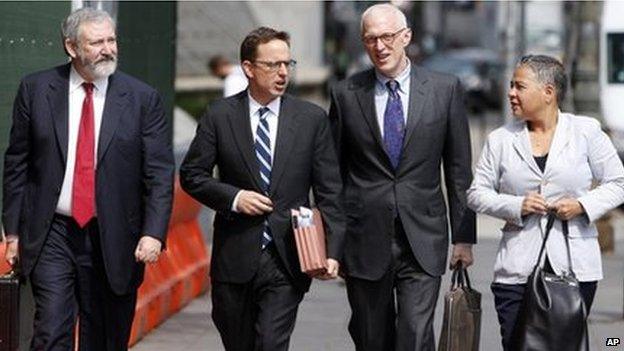Why the bond markets fear Argentina's debt crisis
- Published
- comments

Argentina's legal team says the nation can't afford to pay holdout creditors
In a week's time, Argentina could face another default. This time, there could be a severe impact not just in terms of economic growth but also on bond markets worldwide.
A US court has ordered Argentina to meet with its creditors "continuously" from today until they agree a deal.
But, Argentina's lawyer said that a settlement "can't be done by the end of this month." In which case, Argentina would default.
How did it get here?
Argentina is refusing to abide by a previous US court order to pay all of its creditors, specifically the hold-outs who wouldn't agree to the "haircut" or loss that was accepted by the vast majority of bondholders.
This has taken the country to the brink of another default.
I previously wrote about the events that led up to this point.
The refusal of the US Supreme Court to hear the appellate court case means that the lower court's interpretation of pari passu stands.
That pari passu clause in effect means that Argentina must pay all bondholders and not just the ones who accepted the debt restructuring.
Technical default looms
Even if Argentina won't abide by US law, US banks processing the country's payments to its creditors do.
So, by freezing the country's payments, they have already made it miss one payment on its debt that was due on 30 June.
With a grace period of 30 days, the date of technical default is the end of July. Unless its negotiations with creditors yield fruit, Argentina could default again, within about a decade of the last one.
Needless to say, there's a high degree of unpredictability about what will happen including in the country itself.
More technicalities
There's an added complication.
Argentina says that there's a clause in the exchanged bonds known as RUFO (Rights Upon Future Offers) which will trigger it if pays the hold-outs before the end of the year.
That would mean that all exchanged bonds would get the same treatment, i.e. full payment.
President Kirchner says that payment would amount to $15bn (£8.8bn), which is about half of the entire central bank foreign exchange reserves, so it's not feasible for Argentina to do this.
But, it also implies that it is possible for the country to pay creditors this time around. The looming question, though, is what happens with the next sets of payments.
Why it matters
There are at least 2 implications.
First, when the IMF rescues a country, it sometimes advises on debt restructuring if the debt is simply too large to be repaid. Under those circumstances, creditors accept losses often because they are paid something if not 100%.
But, if there is a pari passu clause like in these bond contracts governed by New York law, then hold-outs can sue for full payment which can make other creditors less inclined to accept a loss.
In other words, how debt restructuring has been done is called into question.
For instance, the IMF is considering extending the time to repay for debt to try and avoid debt write-downs.
Secondly, a multi-tiered bond market could result. So, bonds issued under New York or English law with such equal treatment clauses may be viewed as more secure and command a higher price than bonds which don't.
For bonds, the higher the price, the lower the yield, which translates into cheaper borrowing costs for those countries.
For the eurozone which has begun to impose collective action clauses (CACs) in new bonds that essentially force bondholders to accept a debt deal if a large majority agree it, those bonds could become relatively more costly to issue.
It would be an unintended consequence of their attempt to make future debt restructuring easier after the drawn-out process with Greece.
In any case, the precedent of enforcing pari passu despite all that has been argued is now out there. For common law countries like the US and UK, precedent forms part of the law.
So, at this point, Argentina has already begun to re-shape the global landscape with more still to play out as it stands at the precipice of yet another default.